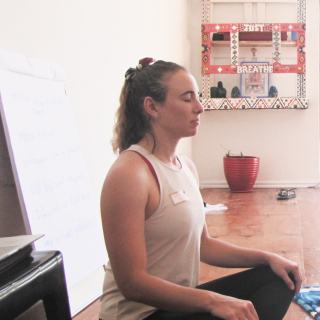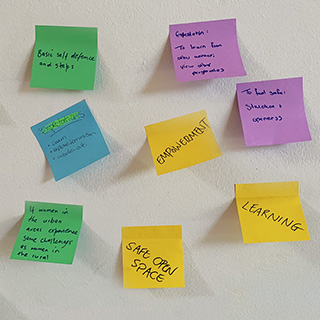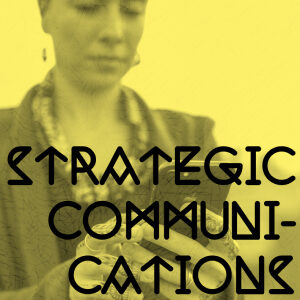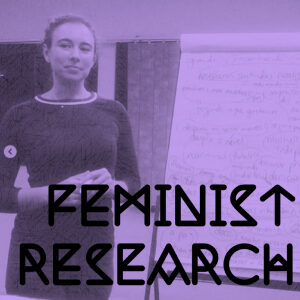Workshop &
Dialogue facilitation
Cases

Feminist Self-and Collective Defense workshop
KwaZulu Natal, South Africa
Client: (Own project, funded by All Women Count and Take Back The Tech! )
In a nutshell: Design, planning and facilitation of an in – person self – and collective defense workshop.
The challenge
The workshop aimed to explore what a framework for feminist self- and collective defense could look like. It was both practice — experimental and embodied — and reflection — through mutual learning and exchange — of the topic, as new tools and emergent articulations of concepts were discussed and enacted, for the first time. A key challenge was the diversity of participants, that ranged from grassroots women’s rights activists to justice-driven healing practitioners, all of whom came from diverse contexts, urban and rural, with different needs, and varied understandings of what ‘feminist’ even means.
The process
Due to the experimental nature of the 5-hour workshop, it was important to get the right people in the room, to engender safety and learning. The expertise of all were assumed, and invited participants were asked beforehand about their learning expectations and understandings of the topic, which informed workshop planning. Over half of the participants that attended were invited to present a defense practice in their work and lead and facilitate different activities, to enhance knowledge exchange. Anticipating risk due to topics of violence that may arise, we discussed risk mitigation and trigger management at the start of the workshop as part of the material for the workshop topic itself. Flexibility in the programme was crucial to allow space for emergent issues that could arise amongst the collective. Post-workshop debriefs were had, at the venue itself, as well as online through follow-up communication with each participant.
The result
The sense of fun experienced by participants in the workshop was a key indicator of safety in the room. The workshop process allowed each participant to take up space and express through spoken word and physical movement. The reluctance of certain participants to leave once the training was over, and the pockets of conversation that took place among participants after the workshop were also indicators of ownership of the space created, and genuine interest in continuing to engage with what had emerged.
Skills implemented
- Project management
- Facilitation of collaborative and mutual learning and exchange among people of diverse backgrounds and experiences
- Workshop design, planning and implementation, with keen attention to safety
- Event planning and logistics
- Project evaluation and learning
- Open, responsive communication with participants before and after the event
- Budget management
- Report writing

Organisational development capacity building workshop
Chimoio, Mozambique
Client: Kusimudzana
In a nutshell: Design, planning and facilitation of an organisational capacity building workshop.
The challenge
Kusimudzana is a grassroots young feminist organisation with whom I connected as a ‘Companion’ as part of FRIDA Fund’s Accompaniment Programme for grantees. My role in the relationship was to engage with Kusimudzana around an area of their work that they wanted to build or improve, and accompany the process of capacity development. For one of the in-person visits, I was requested to facilitate a capacity development workshop with their volunteer staff on project management, developing an annual workplan, and organisational sustainability.
At the time of the workshop, however, I was aware that there had been shifts in staff capacities and roles and felt the need to be attentive to how these shifts would affect the way staff view ‘project management’ and the ‘sustainability’ of the organisation.
The process
I met with the director of Kusimudzana before the workshop to understand what the orgnisation has identified as priorities for the workshop. As the workshop started, we had not begun to delve deeply into the initial sense — making activity before I realised that there was a disconnect between how staff related their roles in the organisation to the desires they had long-term for their own lives. This compelled me to shift the focus from project management, to dreaming and collective vision. We envisioned what values the organisation needed to embody for staff to thrive, and thought practically about how those values ca n manifest, not only in the work ‘out there,’ but in the micro-moments of working together within the organisation. We also brainstormed the role that staff had to play in the sustainability of the organisation, in relation to how the organisation can play a role in sustaining them, particularly in a context characterised by unpredictability and limited resources.
The result
By the end of the workshop, we had not developed an annual workplan, but had collectively envisioned what Kusimudzana wanted to achieve in 20 years’ time and what that meant for our plan for today. We developed a compass of collective ‘senses’ — or values we wanted to tangibly feel — that could guide staff in their everyday collective decision – making and encourage continued ‘dreaming’ together. We expanded our understanding of sustainability beyond financial terms, to an alignment between the desires of staff for a working environment that allows them to thrive, and the internal organisational culture of the organisation.
Skills implemented
- Collaborative decision-making, with a deliberate intention to distribute power and share knowledge
- Flexibility and adaptability to changes in schedule and logistics beyond our control
- Workshop design and planning
- Development of workshop tools and activities
- Deep listening
- Workshop facilitation, with attention to power dynamics, safety and inclusive participation
- Post-workshop debrief, evaluation and learning
- Report-writing


